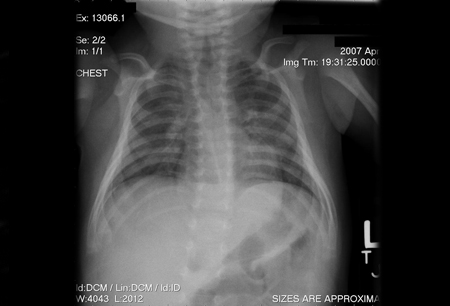Summary
Definition
History and exam
Key diagnostic factors
- at-risk demographic
- family history of SCID, infant death, or consanguinity
- recurrent and unusually severe infections
- chronic diarrhea
- failure to thrive
- absent lymphoid tissue
Other diagnostic factors
- rash
- oral or genital ulcers
- microcephaly
- skeletal abnormalities
- blindness
- dystonia
- radiation sensitivity
Risk factors
- Family history of SCID
- Family history of infant death
- Athabascan-speaking Native American people
- Consanguinity
Diagnostic tests
1st tests to order
- CBC
- flow cytometry
- chest x-ray
- quantitative immunoglobulin test (IgG, IgM, and IgA)
Tests to consider
- chest ultrasound
- CT scan of the chest
- MRI chest
- fundoscopy
- enzyme testing
- serum uric acid
- T-cell proliferation studies
- polymerase chain reaction-based viremia testing
- radiation sensitivity of fibroblast cultures
- genetic testing
Treatment algorithm
confirmed SCID
Contributors
Authors
Javier Chinen, MD, PhD
Professor
Pediatrics, Allergy, and Immunology
Baylor College of Medicine
Texas Children’s Hospital
Houston
TX
Disclosures
JC declares that he has no competing interests.
Acknowledgements
Dr Chinen would like to gratefully acknowledge Dr John M. Cunningham, Dr James L. LaBelle, Dr John Routes, Dr James Verbsky, Dr Nicole Chase, and Dr Ebrahim Shakir, the previous contributors to this topic.
Disclosures
JLL, JR, JV, and NC are authors of references cited in this topic. JMC and ES declare that they have no competing interests.
Peer reviewers
Elizabeth Secord, MD
Professor of Pediatrics
Division of Immunology
Wayne State University School of Medicine
Detroit
MI
Disclosures
ES declares that she has no competing interests.
Waseem Qasim, BMedSci (Hons), MBBS, MRCP (UK), MRCPCH, PhD
Senior Lecturer
Institute of Child Health
Consultant in Paediatric Immunology & Bone Marrow Transplantation
Great Ormond Street Hospital
London
UK
Disclosures
WQ declares that he has no competing interests.
Peer reviewer acknowledgements
BMJ Best Practice topics are updated on a rolling basis in line with developments in evidence and guidance. The peer reviewers listed here have reviewed the content at least once during the history of the topic.
Disclosures
Peer reviewer affiliations and disclosures pertain to the time of the review.
References
Key articles
Bousfiha A, Moundir A, Tangye SG, et al. The 2022 update of IUIS phenotypical classification for human inborn errors of immunity. J Clin Immunol. 2022 Oct 6 [Epub ahead of print]. Abstract
Tangye SG, Al-Herz W, Bousfiha A, et al. Human inborn errors of immunity: 2022 update on the classification from the International Union of Immunological Societies Expert Committee. J Clin Immunol. 2022 Jun 24;1-35 [Epub ahead of print].Full text Abstract
Bonilla FA, Khan DA, Ballas ZK, et al. Practice parameter for the diagnosis and management of primary immunodeficiency. J Allergy Clin Immunol. 2015 Nov;136(5):1186-205.e1-78.Full text Abstract
Buckley RH. Molecular defects in human severe combined immunodeficiency and approaches to immune reconstitution. Ann Rev Immunol. 2004:22:625-55. Abstract
Heimall J, Buckley RH, Puck J, et al. Recommendations for screening and management of late effects in patients with severe combined immunodeficiency after allogenic hematopoietic cell transplantation: a consensus statement from the second pediatric blood and marrow transplant consortium international conference on late effects after pediatric HCT. Biol Blood Marrow Transplant. 2017 Aug;23(8):1229-40.Full text Abstract
Candotti F, de Villartay JP, Moshous D, et al. Severe combined immune deficiency. In: Sullivan KE, Stiehm ER, eds. Stiehm’s immune deficiencies: inborn errors in immunity. 2nd ed. Cambridge, MA: Academic Press, 2020:153-205.
Reference articles
A full list of sources referenced in this topic is available to users with access to all of BMJ Best Practice.

Differentials
- 22q11.2 Microdeletion Syndrome/DiGeorge syndrome
- Omenn syndrome
- Zeta chain-associated protein 70 deficiency
More DifferentialsGuidelines
- Recommendations for screening and management of late effects in patients with severe combined immunodeficiency after allogeneic hematopoietic cell transplantation
- Practice parameter for the diagnosis and management of primary immunodeficiency
More GuidelinesLog in or subscribe to access all of BMJ Best Practice
Use of this content is subject to our disclaimer